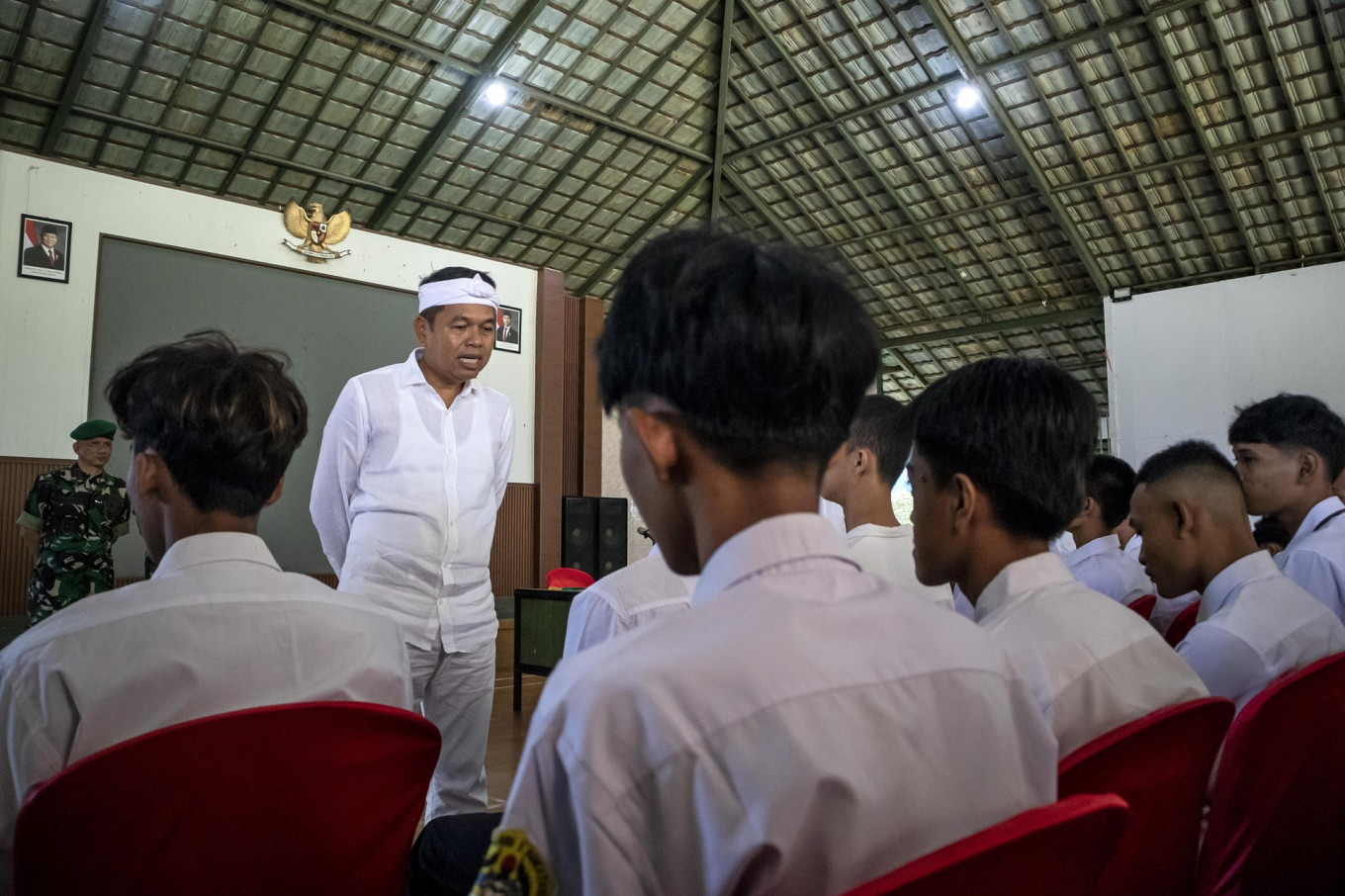Popular Reads
Top Results
Can't find what you're looking for?
View all search resultsPopular Reads
Top Results
Can't find what you're looking for?
View all search resultsEarly school a new burden
Several studies in developed countries such as Singapore and England have shown that delaying school start times actually improves students’ well-being and academic performance.
Change text size
Gift Premium Articles
to Anyone
 Dubious tactics: West Java governor Dedi Mulyadi (third left) talks with students on May 5 while inspecting a character and discipline training session at a military education center in West Bandung regency, West Java. Hundreds of students from various regions across West Java who have been involved in street brawls, motorbike gangs and addicted to online gaming have been sent to undergo intensive training led by Indonesian Military (TNI) personnel for at least 14 days. (Antara/Abdan Syakura)
Dubious tactics: West Java governor Dedi Mulyadi (third left) talks with students on May 5 while inspecting a character and discipline training session at a military education center in West Bandung regency, West Java. Hundreds of students from various regions across West Java who have been involved in street brawls, motorbike gangs and addicted to online gaming have been sent to undergo intensive training led by Indonesian Military (TNI) personnel for at least 14 days. (Antara/Abdan Syakura)
F
our months into his term, West Java Governor Dedi Mulyadi is frequently trending on social media and has made national headlines for his policies, which have been met with mixed reactions, including praise from the public and criticism from experts.
One of the sectors that the governor seems to pay attention to the most is education and youth development, as he has issued policies for schools and students aimed at instilling discipline and values derived from Sundanese cultural wisdom.
Among the latest policies Dedi introduced is enforcing earlier school start times across all education levels in the predominantly-Sundanese province.
In a circular issued in late May, the governor imposed a policy that students from kindergarten to senior high school would begin school at 6:30 a.m. The measure will take effect in the upcoming academic year, which begins in mid-July.
The policy, issued under the pretext of adhering to the 2017 regulation on school days, under what was then the education and culture ministry, also mandates different school durations for each level of education. Preschool students will have a minimum duration of 195 minutes per day, while those in elementary and high school education will stay in school for at least 10 hours each day.
The circular calling for earlier school start times was immediately opposed by educators, who questioned the urgency and scientific basis of the policy. Some teachers argued it would put more burden on students and their families, as many live more than 10 kilometers from their schools without adequate access to public transportation.
Critics also argue that the early school start time contradicts with another of Dedi's controversial policies: A student curfew from 9 p.m. to 4 a.m. They claim that the curfew's goal of promoting healthier sleep routines is undermined by forcing students to wake up earlier.
Educators have raised other concerns that earlier school start times may cause sleep deprivation among children. Studies show that a lack of sleep in children often results in poor concentration and memory retention, as well as inadequate physical and mental development, all of which may lead to a decline in academic performance.
Critics have noted the irony that a policy for a sector revolving around science does not follow scientific findings and consensus.
Several studies in developed countries such as Singapore and England have shown that delaying school start times actually improves students’ well-being and academic performance.
Finland, a country that Indonesia often looks up to on educational matters, begins most of its classes around 9 a.m., which contributes to lower stress levels and better student focus.
Dedi argued that the education policies, including sending “misbehaving students” to military-style boot camps, are aimed at curbing youth delinquency, such as engaging in street brawls and gang activity or falling into online gaming addiction.
But there are many ways to instill discipline and prevent violent acts among students, and telling the children to go to school early and threatening to send them to barracks are not the best ways to do so.
Dedi and his aides should look at the bigger picture before issuing any education policies in the province. Better pay for teachers and increased funding for schools, as well as education governance, are believed to be solutions to improve education quality that could help in preventing street brawls and other youth delinquency.
Studies also highlight the importance of open public space and communal activities as avenues toward reducing delinquency, allowing young people to express themselves and their creativity in a healthy manner, rather than spending their free time on gadgets or fighting each other.
Critics have accused Dedi and his policies of being “populist”, a means to build a good image that would help him in his future political venture. While building popularity is fine, it should not be done at the expense of children’s well-being.
Perhaps it’s time for the governor to shift from appearance, which has so far awarded him popularity, into substance, which would enable him to leave a lasting and meaningful legacy.










